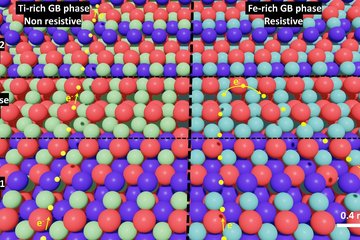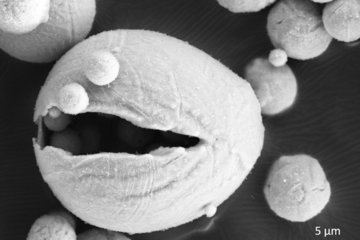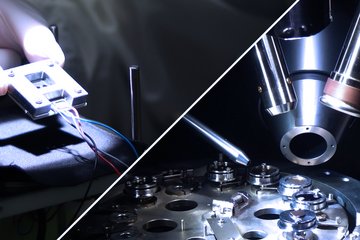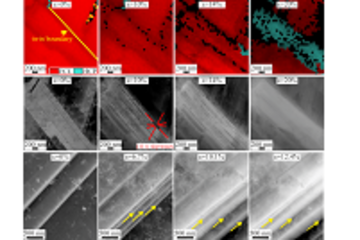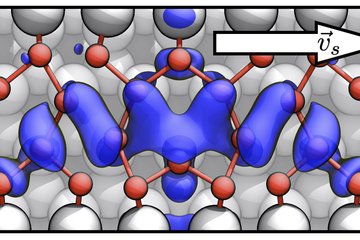All genres
181.
Talk
High-throughput optimization of finite temperature phase stabilities: Concepts and application. Coffee with Max Planck, virtual seminar organized by the MPIE, Düsseldorf, Germany (2021)
182.
Talk
High-throughput optimization of finite temperature phase stabilities: Concepts and application. Coffee with Max Planck, virtual seminar organized by the MPIE, Düsseldorf, Germany (2021)
183.
Talk
High-throughput optimization of finite temperature phase stabilities: Concepts and application. IMWF Stuttgart, Colloquium Materials , virtual, Stuttgart, Germany (2020)
184.
Talk
pyiron – an integrated development environment for ab initio thermodynamics. AMS Seminar, virtual, Bochum, Germany (2020)
185.
Talk
Automated ab-initio Determination of Materials Properties at finite Temperatures with pyiron. NIST Workshop, virtual, Rockville, MD, USA (2020)
186.
Talk
Modeling crystal growth and materials design in high dimensional chemical and structural configuration spaces. German Conference on Crystal Growth DKT 2020, München/Garching, Germany (2020)
187.
Talk
Materials Design in High Dimensional Chemical and Structural Configuration Spaces. TMS 2020 Annual Meeting & Exhibition, San Diego, CA, USA (2020)
188.
Talk
Application of Density Functional Theory in the Context of Phase Diagram Modelling. MSIT Winter School on Materials Chemistry, Virtual Event, Castle Ringberg, Tegernsee (2020)
189.
Talk
Ab initio basierte Simulation zur Wasserstoffversprödung in hoch-Mn Stählen. Seminar der Staatlichen Materialprüfungsanstalt Darmstadt, Institut für Werkstoffkunde, Darmstadt, Germany (2020)
190.
Talk
Innovative concepts in materials design to boost renewable energies. Seminar of Institute for Innovative Technologies, SRH Berlin University of Applied Sciences, Berlin, Germany (2020)
191.
Talk
Construction and exploitation of large ab initio data spaces to design materials with superior mechanical properties. MRS-J: Materials Research Meeting 2019, Yokohama, Japan (2019)
192.
Talk
Automated ab-initio Determination of Materials Properties at finite Temperatures with pyiron. CNLS Seminar, Los Alamos, NM, USA (2019)
193.
Talk
Ab initio descriptors to design materials with superior mechanical properties. Materials Day, ETH Zürich, Zürich, Switzerland (2019)
194.
Talk
Ab initio description of coupling phenomena between magnetic and structural degrees of freedom. EASTMAG2019 – VII Euro-Asian Symposium “Trends in Magnetism”, Jekaterinburg, Russia (2019)
195.
Talk
Ab initio simulation of finite temperature phase stabilities: Concepts and application. HetSys Launch Event, Warwick, UK (2019)
196.
Talk
Atomistic investigation of stacking faults in non-stoichiometric Fe–Nb Alloys. EUROMAT 2019, Stockholm, Sweden (2019)
197.
Talk
Ab initio input for multiphysics models: Accuracy, performance and challenges. ISAM4: The fourth International Symposium on Atomistic and Multiscale Modeling of Mechanics and Multiphysics, Erlangen, Germany (2019)
198.
Talk
Precipitate-induced nonlinearities of solute diffusion in Al-based alloys. 15th Diffusion in Solids and Liquids (DSL) Conference, Athens, Greece (2019)
199.
Talk
Ab initio design strategies for NiMn-based FSMA. 6th Int. Conf. of Ferromagnetic Shape-Memory Alloys CFSMA, Prague, Czech Republic (2019)
200.
Talk
Exploiting large ab initio data spaces to design materials with superior mechanical propertiess. 2019 BIOVIA User Conference, Düsseldorf, Germany (2019)




